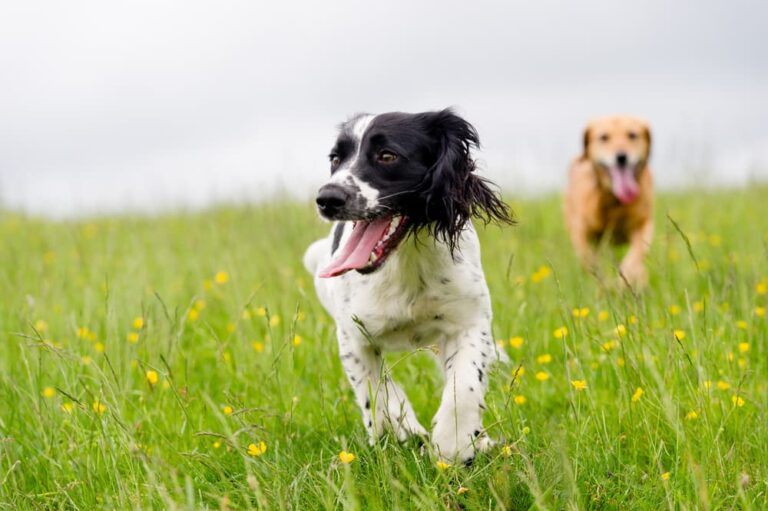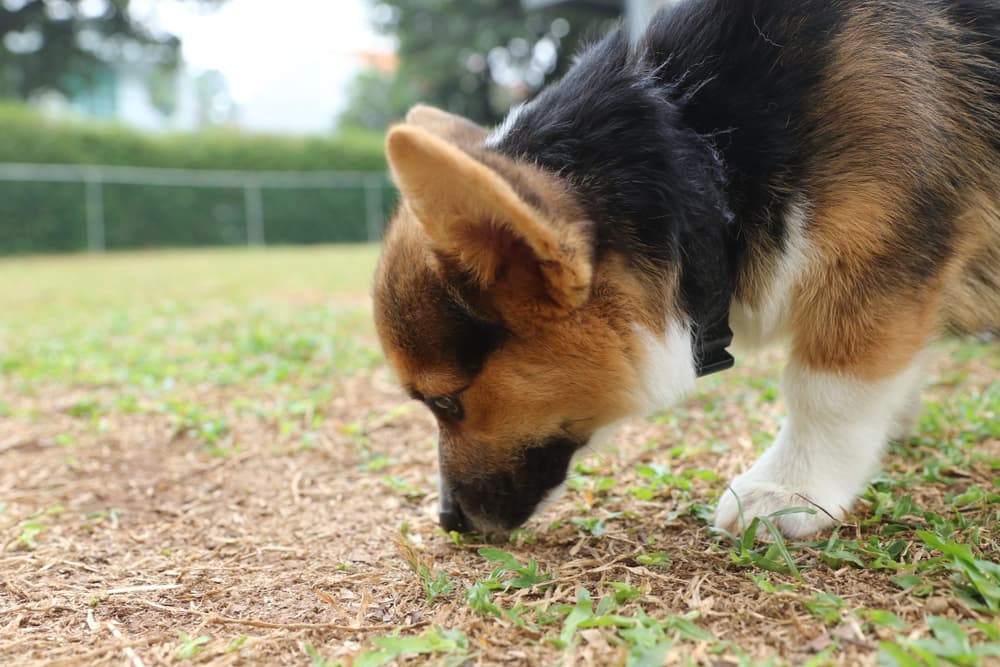Sponsored by Elanco
8 Suspicious Symptoms in Active Dogs

Whether they’re in the garden chasing a squirrel or hiking with you through the countryside, active dogs long for adventure. One only has to observe the sheer excitement on a dog’s face when he sees a squirrel to know that experiencing wildlife is one of man’s best friend’s greatest pleasures.
In order to experience the best nature has to offer, it is important to protect your dog’s health against contagious parasites harboured by wildlife and other dogs and cats, including fleas, ticks and worms. One way to protect your dog is to recognise the subtle symptoms of infection before the problem gets worse.
The following are eight suspicious symptoms in active dogs, potential causes of these symptoms and what to do if you notice them.
8 Suspicious Symptoms in Active Dogs
Dog Coughing
Dogs cough for a variety of reasons. Non-infectious causes of coughing in dogs include heart disease, cancer, bronchitis, allergies and pneumonia. The most common infectious causes of dog coughing is kennel cough and less commonly lungworm.
Fortunately, many of the infectious causes of coughing in dogs can be prevented. Effective vaccines reduce the likelihood that your dog will contract kennel cough. Parasites and worms can be protected against with a broad-spectrum antiparasitic that protects against multiple worms, including lungworm and intestinal worms. Ask your vet for details.
If you notice your dog coughing and it lasts for more than 24 hours, if your dog has a lack of energy or if your dog has pale gums, schedule an appointment with your vet immediately to get your dog checked out.
Dog Scratching or Excessive Licking

Excessive scratching or licking in dogs is always suspicious. Dogs often scratch or chew themselves for one reason: they are itchy. Even though many things can make a dog itch, fleas are the number one reason dogs scratch themselves.
Some dogs are so sensitive that flea bites cause an allergic reaction (called flea allergy dermatitis) in which they may scratch themselves raw. Other possible causes of excessive scratching can include seasonal allergies, skin mites, yeast and bacterial infections. Food allergy can also cause dogs to scratch, itch and lose their hair.
If your dog is scratching more than usual, get it checked out by a vet. They will conduct an exam and may recommend skin testing and treatment. If fleas are involved, then a tablet that protects against fleas and ticks may be recommended. By using a monthly tick and flea medication, you can accomplish two goals simultaneously: killing adult fleas and treating flea infestations, as well as controlling tick infestations.
Head Shaking in Dogs

Dogs shake their heads or scratch their ears if they have something in their ear or if their ear is infected, itchy or painful. For instance, dogs can get grass seeds lodged in their ears after sniffing around the grass. Dog ears can also get infected with mites, yeast or bacteria.
Head shaking is a suspicious sign that something is wrong with one or both ears and if it doesn’t stop after a day, or your dog is violently shaking his head and won’t stop, see a vet.
Loose Stools in Dogs
Dogs can get into all sorts of unsavoury places, leading to gastrointestinal inflammation, infection, vomiting and diarrhoea. Intestinal parasites, GI inflammation, pancreatitis and diet change, hunting and scavenging are all things that can cause abdominal pain and loose stool.
If you notice diarrhoea or loose stool that is severe, bloody, accompanied by vomiting or lasts more than 24 hours then call your veterinarian.
If you notice something suspicious in your dog’s stool that resembles grains of rice or spaghetti, it can be a sign of intestinal parasite infection. Ask your vet about a broad-spectrum antiparasitic that protects against multiple worms, including tapeworm.
Lumps in Dogs
Lumps and bumps on the skin can be anything from infected abscesses to tumours to burrowing parasites to warts, to name a few. It’s also very common for pet parents to bring their dog to the veterinarian with a new “bump” and discover it’s an engorged tick.
Abscesses are usually the result of infected bite wounds. They appear swollen, fluid-filled, warm to the touch and may be painful or draining pus.
If your dog has a tumour, keep in mind that some are benign and do not require treatment, while others should be removed as soon as possible.
If your dog has a wart, it will appear firm and flat and there may be more than one.
Any lumps or bumps that you notice should be brought to the attention of your veterinarian as soon as possible.
Dog Scooting
 Dogs scoot their bums around when they are itchy. Scooting is when a dog sits down and drags their bottom along the ground. Itchy bums in dogs are often caused by anal gland irritation or infection, where one or both scent glands located just inside the anus get irritated or too full.
Dogs scoot their bums around when they are itchy. Scooting is when a dog sits down and drags their bottom along the ground. Itchy bums in dogs are often caused by anal gland irritation or infection, where one or both scent glands located just inside the anus get irritated or too full.
Dog scooting can also be caused by tapeworms, an intestinal parasite. Infected dogs will shed tapeworm segments in their faeces. Some tapeworm segments look like grains of rice that often adhere to the anus or the hair around the anus, while other types of tapeworm are not visible with the naked eye.
The most common tapeworms are transmitted by fleas, so if your dog has fleas, it is likely that your dog also has tapeworm. Fleas are only one source of tapeworms, however. Dogs can also contract tapeworm from rodents and other small mammals, wildlife and raw meat.
If your dog is scooting (dragging their bum along the floor), ask a vet to check your dog out to see if the anal glands need to be expressed, or if a broad spectrum dewormer and flea control need to be instituted.
Lack of Energy in Dogs

If your normally active dog is acting lethargic, it could be a suspicious sign. Dogs can act lethargic if they are too hot or have played or run too much. This lack of energy in dogs usually resolves itself on its own.
However, lack of energy in dogs can also be caused by pain, hormonal problems, liver disease, heart disease, kidney disease, brain or nervous disorders and many other things.
If you notice your dog has lower energy than normal for longer than one day’s duration, make an appointment with your vet.
Dog Losing Weight
Weight loss happens when a dog is not eating enough, not absorbing calories from the gut due to parasites or gastrointestinal disease, or losing too many calories to parasites, cancer or other diseases.
If you have checked with your vet and are feeding your dog an appropriate amount of food and yet your healthy, happy and active dog is still losing weight, then something is not right.
If your dog is eating a normal or increased amount of food and is still losing weight, then it is time to enlist the help of your local vet. They will ask you questions, conduct an exam on your dog and recommend a faecal test. They may recommend blood or urine tests. Depending on the results of the tests, they might recommend treatment and/or diet modification.
Intestinal parasites are some of the most common causes of weight loss in active, puppies. Some of these worms are even contagious to humans. Infections with small numbers of worms may go unnoticed initially, while the worms’ eggs are passed along in the dog’s faeces and can contaminate the surrounding environment, resulting in future infections. Fortunately, it is easy to protect your dog by using a broad-spectrum antiparasitic that protects against multiple worms. Ask your vet for details.
Knowledge is power. Knowing how to monitor for these suspicious symptoms in dogs and what to do if you notice them may help prevent health problems or pain in your furry friend. Who knows, you might just save your dog’s life.
For further information call Elanco Animal Health on +44(0)1256 353131 or write to Elanco UK AH Limited, Form 2, Bartley Wood Business Park, Hook, RG27 9XA, United Kingdom. Elanco is a trademark of Elanco or its affiliates © 2020 Elanco or its affiliates. PM-IE-20-0080. Date of preparation 03/20.




